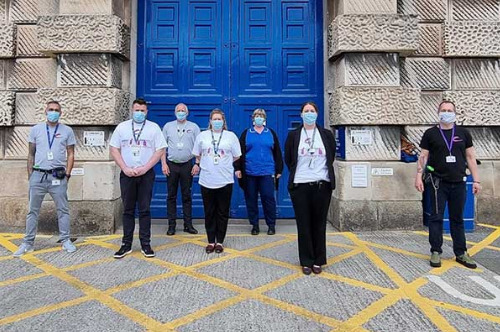Last week, every prisoner in HMP Exeter was offered testing (HITT) to see if they have the potentially life-shortening Hepatitis C, as part of the largest programme to eliminate the virus in Europe.

Working together with the Hepatitis C Trust and pharmaceutical company Gilead, Practice Plus Group are attempting to eliminate the virus by 2025. Last week a HCV High Intensive Test and Treat (HITT) intervention took place, testing 97.6% of the prison population for Hepatitis C.
The virus is often thought of as a hidden virus, as people can live with it for a long time without knowing they have it. Early symptoms are similar to those of other illnesses; such as depression, feeling tired all the time, skin problems, insomnia, pain and digestive problems. However, if left untreated, some of those affected will go on to develop cirrhosis and, in severe cases, life-threatening problems such as liver failure or liver cancer.
Hepatitis C is most often contracted through the sharing of drug paraphernalia including syringes used by people taking illegal drugs. At the most challenging stages of a patient’s addiction, they will rarely engage with healthcare services and therefore have little opportunity of being diagnosed. Consequently, engagement and treatment in the community is very difficult.
Dr Iain Brew, Deputy National Medical Director for Practice Plus Group’s Health in Justice division, said: “The UK has approximately 84,000 prisoners. HCV affects as many as one in 20 in male prisons according to Public Health England data, and an even higher proportion in female prisons. While also eliminating the virus, this programme seeks to set best practice and pathways for the benefit of prisoners everywhere.”
“From May 2019 to February 2021, Practice Plus Group prison treatments for HCV accounted for 8% – or one in 13 of all hepatitis C treatment starts in England. This marks a significant contribution to the elimination goal, and it has also led to a far greater understanding of the virus for many involved in the justice system.”
Dr Iain Brew, Deputy National Medical Director
Chief executive of the Hepatitis C Trust Rachel Halford explained:
“Prisons offer a unique opportunity for people to engage. The environment is relatively stable and residents have access to healthcare screening, treatment, support and harm prevention education, including information on transmission routes. This significant window is enhanced by the access and support provided by the invaluable Hepatitis C Trust peers who operate within the prisons.
By testing, educating and treating we not only help patients, but we also help to protect those communities that our patients return to at the end of their sentences from what is a harmful virus.”

